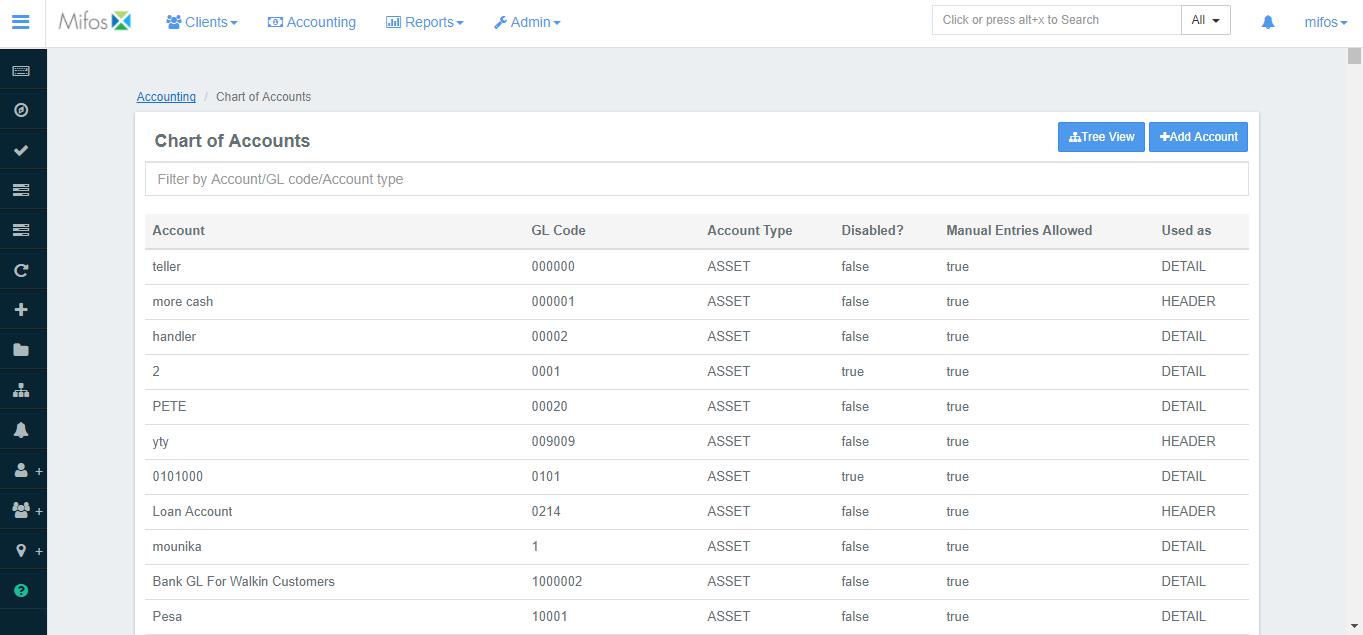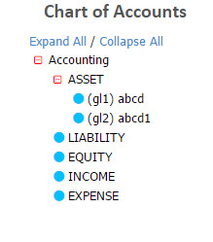Chart of Accounts - General Ledger Setup
The Chart of Accounts - General Ledger Setup allows you to organize your different accounts within Mifos X. Accounts can be organized into Header and Detail (sub) accounts using the respective account types: Asset, Equity, Expense, Income and Liability.
How to Navigate?
Navigate to Accounting >> Chart of Accounts (as shown in the screenshot below):
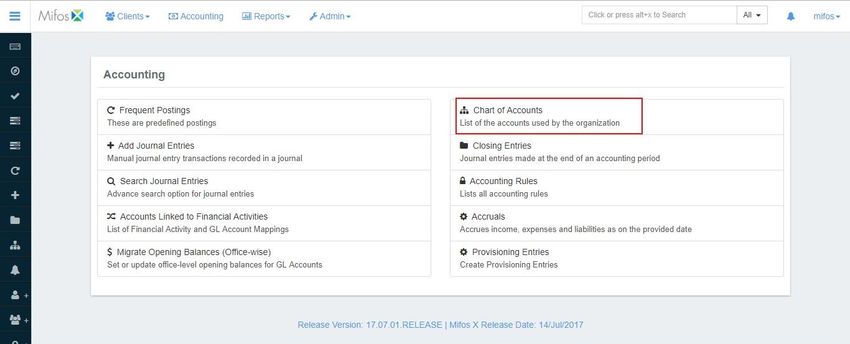
Account usage is divided into Header accounts and Detail accounts. You could start creating with Header and then switch to a sub-ledger account afterwards. When setting up your accounts, it is advisable to set them up one at a time. For example create all of your Header accounts for Assets and then set up all Detail accounts for Assets as well. Follow the same sequence for other account types(namely Equity, Expense, Income and Liability accounts).
How to Create GL Account?
- On the Chart of Accounts page, click the
 button at the top-right of the screen:
button at the top-right of the screen: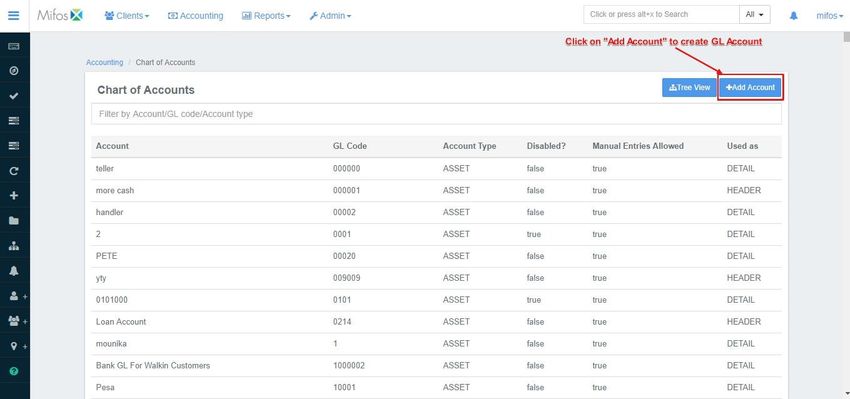
- Select the Account Type from the drop-down menu.
Furthermore, fill in the optional information on the right side of the screen if you wish to do so. - Type the GL (General ledger) Code.
For example: 10000 - Select Header from the Account Usage drop-down menu.
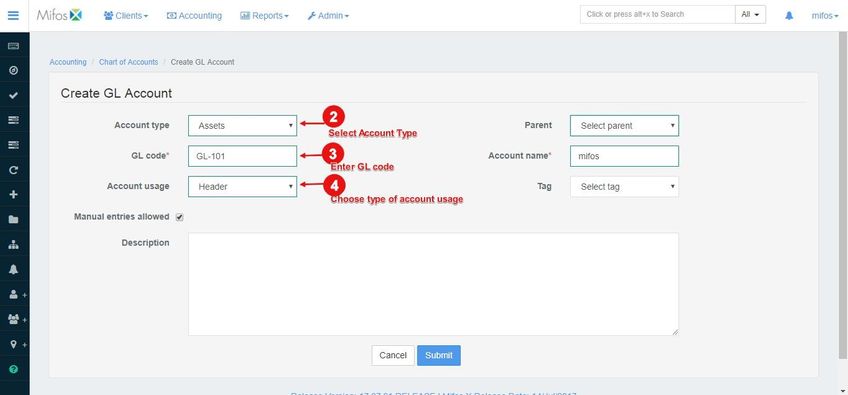
- Select a Parent from the drop-down menu (if required).
- Type the Account name.
For example: Cash & Bank - To allow Manual Entries, click on the check box next to it to make sure it is checked.
Select a Tag from the drop-down menu.
How to Create Tag?
- In the Search Bar on the top of the page, type "tags", and a list of tags associated with assets, equity, expenses, income and liability will be displayed:
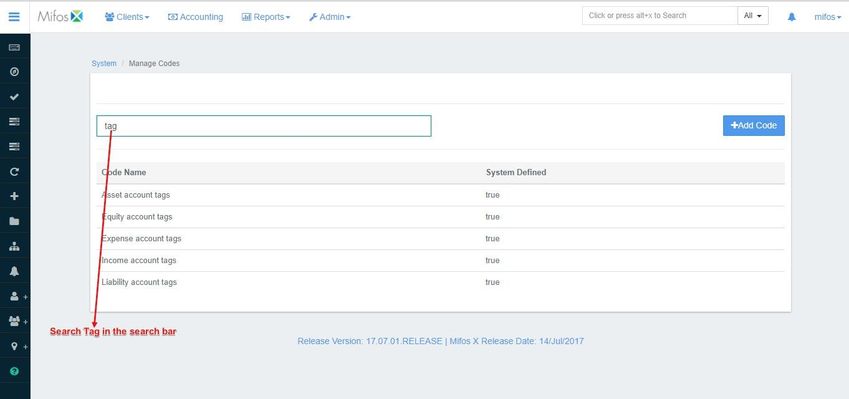
- Click on the required type of tag. In this example, I'll be selecting "Asset account tags" and will create two types of asset tags: "Bonds" and "Jewelry" (as shown in the screenshot below):
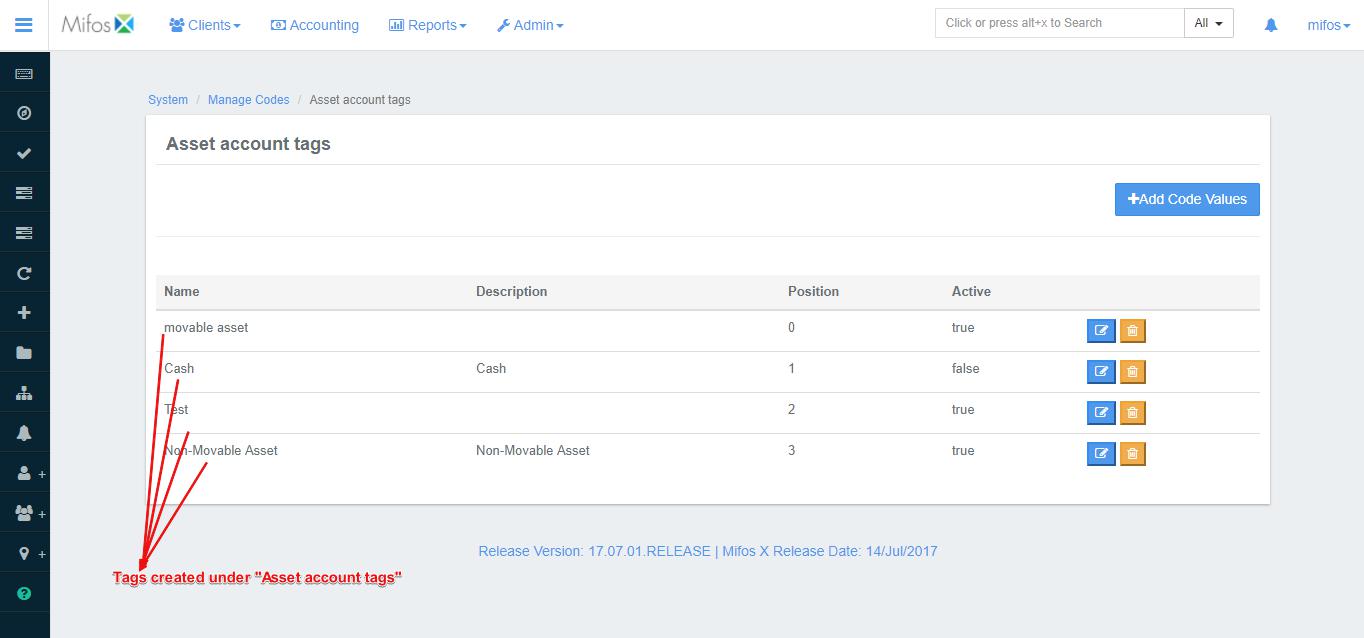
- Once the tags are defined, go back to the GL Account Creation page and select "Account Type" as Assets under the "tags" drop-down menu. This will display the tags associated with Assets:
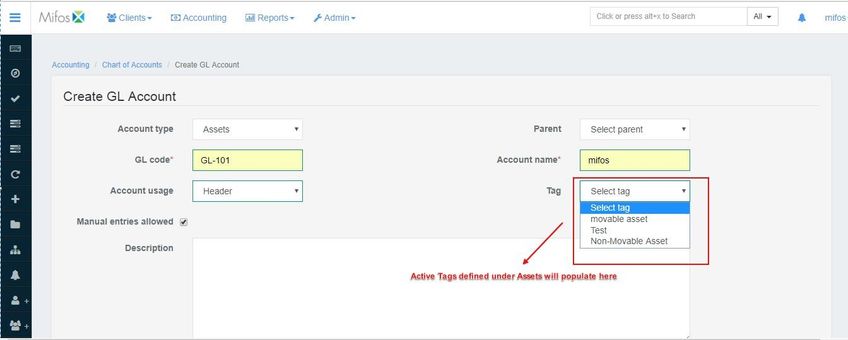
- Type a Description in the text box provided:
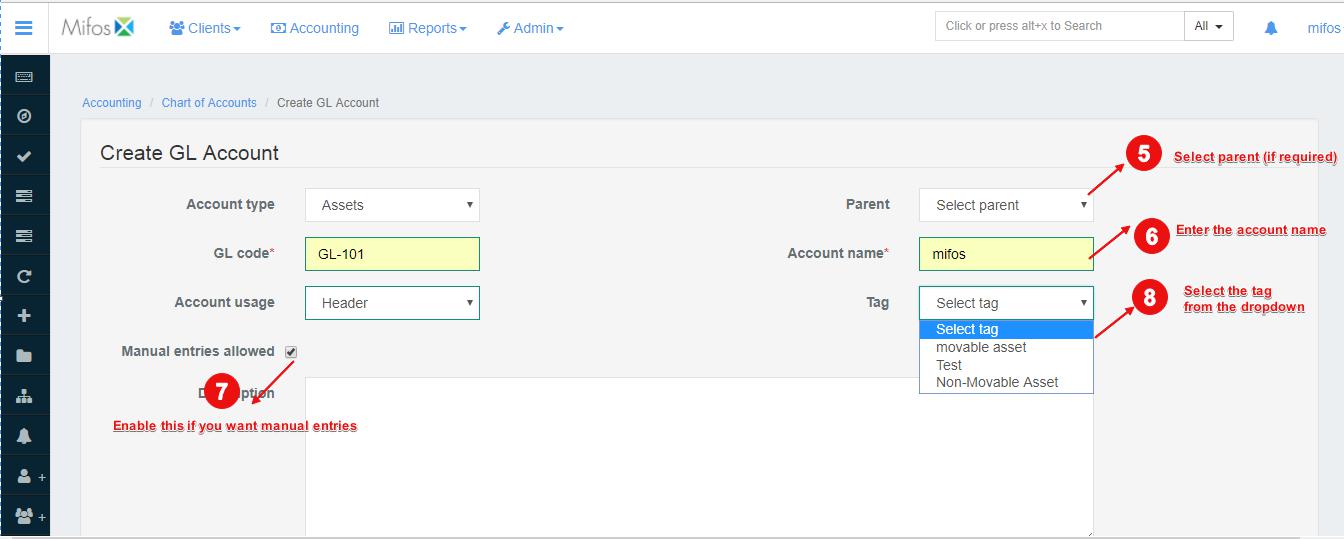
- When you are done with filling all the fields, click on
 .
.
How to Create Sub-ledger Account?
The Account Usage option should be set to Detail if this sub-ledger account is used for passing journal entries.
Further sub-ledgers cannot be created under this sub-ledger.
If you want to create a sub-ledger under this sub-ledger, set the Account Usage option to Header instead.
- From the Chart of Accounts page, click on the existing GL Account which has Account Usage set as as Header. This will redirect you to a new page. Click on
 :
: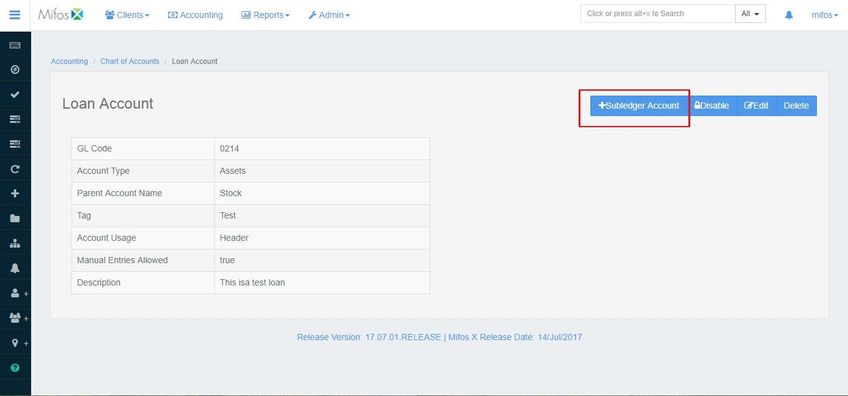
- Type the Account name.
- Next, fill in the GL Code.
- Select Detail from the Account Usage drop-down menu.
- To allow Manual Entries, click on the check box next to it to make sure it is checked.

- Next, fill in the optional information on the right side of the screen if you wish to do so.
- Select the Account Type from the drop-down menu.
- Select a Tag from the drop-down menu (which has been further documented in GL account creation).
- Select a Parent from the drop-down menu.
- Type a Description in the text box provided:
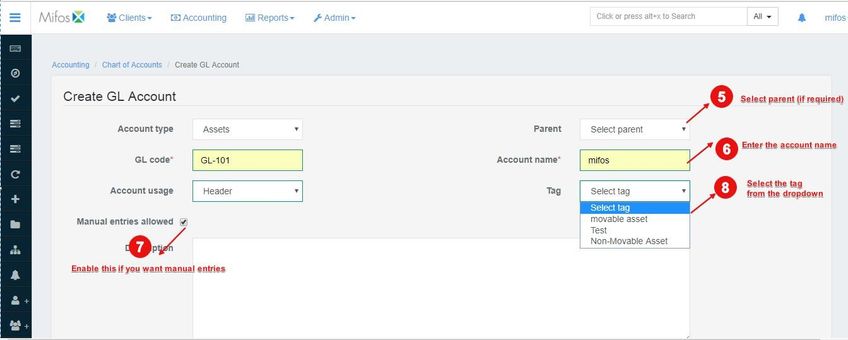
- Click

Overview of General Ledger Accounts
Once you have navigated to the Chart of Accounts page, you will be presented with a chart of all the accounts being used by your organization. You may filter the results by typing any keyword in the Filter by Account/GL Code/Account type field. Alternatively, you may view this chart in a Tree View - please see the View Chart of Account (Tree View) section below to learn about this.
View Chart of Accounts (Tree View)
There is an alternative way to view your accounts - using the Tree View. From the Chart of Accounts page, click the the blue Tree View button at the top-right of the screen.
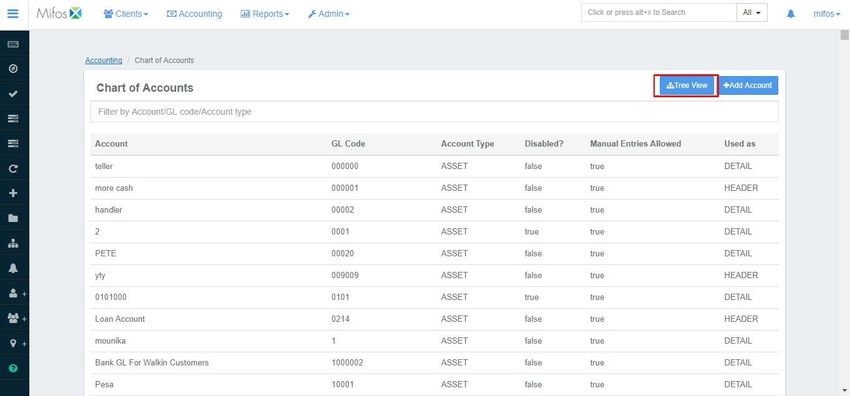
You will be taken to a new screen (with the same title as the previous one) having only one entry, with a small '+' sign on the left:

Click on the '+' sign to expand the tree. A typical result may look like the one shown in the screenshot below. This is an effective way to examine the structure of your organization's accounts within the Mifos system:
Edit, Disable or Delete an Existing Account
You may edit, disable or delete an existing account by navigating to it's Detail page. You can do this by clicking on an account on the Chart of Accounts screen. Search for the account you would like to edit and click on it - it will be highlighted in blue when the cursor is hovering over it:

Once you click on the desired account you will be taken to a screen with more details for that account. An example of this has been shown below (note the three blue buttons to the right of the screen):
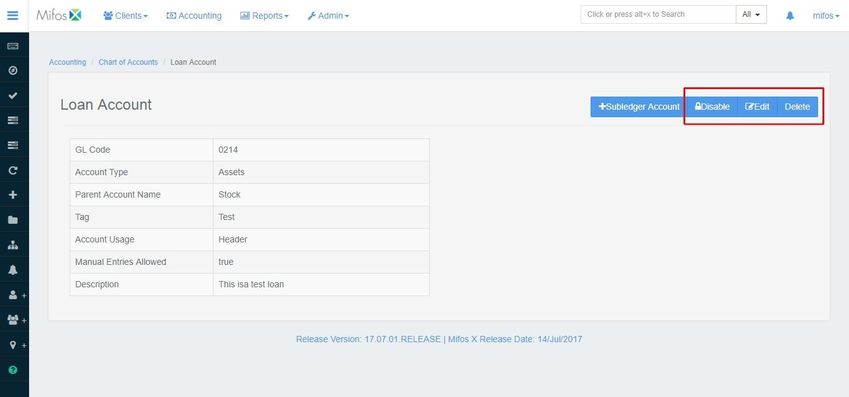
- To Disable the selected account, click the blue Disable button at the top-right of the screen. To re-enable it, click the button again.
- To Delete the selected account, click the blue Delete button at the top-right of the screen. This will launch a pop-up window - click the blue Confirm button to confirm the deletion of the account.
- To Edit the selected account, click the blue Edit button at the top-right of the screen. This will launch the Edit GL Account page:
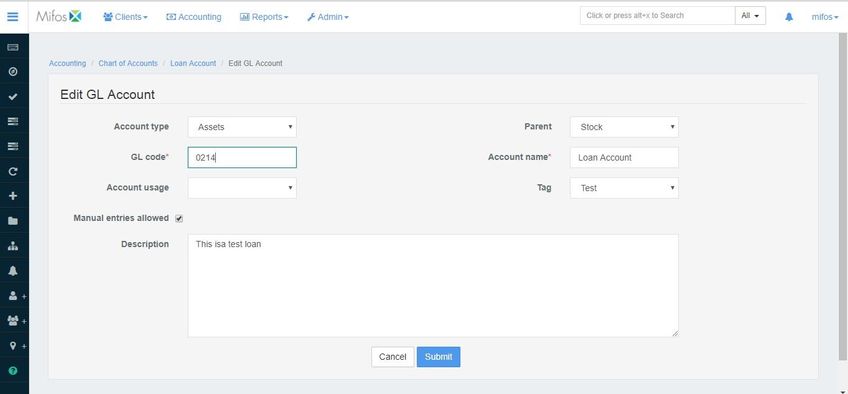
Once you are done making the necessary changes, click on  .
.
Related Articles
-
Page:
-
Page:
-
Page:
-
Page:
-
Page:
On this page:
